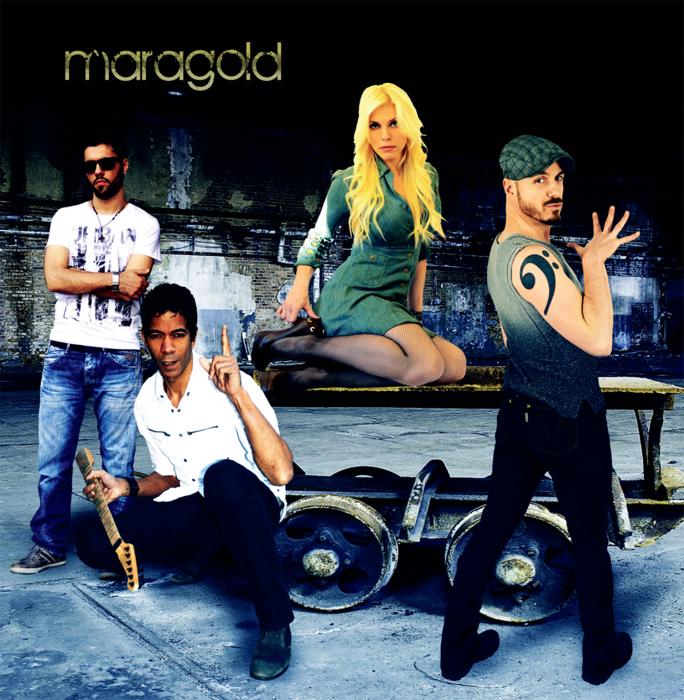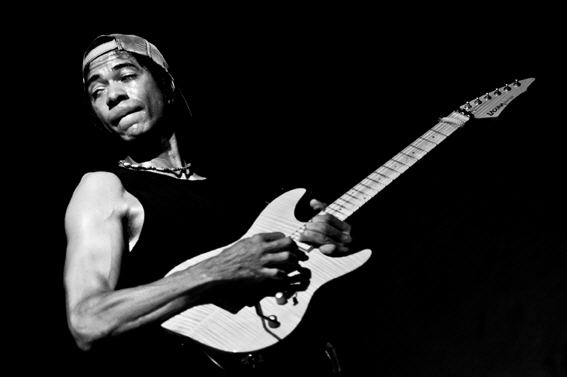
Greg Howe is a virtuoso, a master of his instrument. His playing style is incredibly fluid, informed by fusion and jazz, in addition to pure shredding rock. Below is a transcript of my interview with him following the Las Vegas debut of his new band, Maragold, at Backstage Bar & Billiards on September 19, 2014. He graciously answered a wide range of questions from this guitar nerd.
Greg Howe Interview, September 20, 2014
ZRock’R Magazine: This is Brad Bailey of ZRock’R Magazine speaking with Greg Howe, guitar legend, from his new project, Maragold. I thank you for talking with us.
Greg Howe: Ah, thanks for having me.
Z: I (have) randomly scribbled a bunch of guitar questions, because that’s all I care about.
GH: Uh, oh. (laughs)
Z: The gear you can’t live without.
GH: Wow, um. Honestly, it would be difficult to live without my Buddy Guy wah pedal.
Z: Why is it, is that one voiced differently?
GH: It’s actually the closest thing to a standard Dunlop way, but supposedly its also true bypass. The closest thing to a true bypass version of that.
Z: OK, and that’s, as opposed to buffered, what’s the difference there?
GH: Well, its just that there’s no coloring, really, which is weird, because a lot of people have gotten so used to the coloring that come with wahs, that they don’t want it to be true bypass, they just know what that is.
Z: The Buddy Guy one, I noticed that on there, a big connection for me, when I was a kid, my dad and I were into the Damn Right I’ve Got The Blues album, and we would go on vacation and torture my step mom by playing “Five Long Years,” which is like, you know, over and over again while we’re driving across the country. So it was like, “Oh, the CD skipped, we gotta start it all over again.”
Hair scrunchie, that seems to be the real “Most Important Piece of Gear” you can’t live without. (Greg performs with an elastic hair tie on the neck of his guitar.)
GH: I could real go on for a long time about this. But anyone who has my instructional video that I did years ago, will notice that I didn’t have the scrunchie back then. ‘Cause the thing is I used a lot more distortion back then, and when you use a lot of distortion, what happens is, the notes that are hitting the front end of the amp hit so hard that even if there’s string noise, you don’t hear it. So the note that is being featured the most gets all the love. But when I got more conscious of tone, and started backing off of gain on the front end, I noticed that a lot of the, particularly string-skipping tapping things that I would do were much more difficult to keep clear sounding. You get all the string noise, so the hair tie seems to keep that nice and clean. So that has worked out great, and I noticed that a lot of other guitar players now are doing that.
Z: Just seeing you seamlessly move it up, OK now first fret so I can play down here…
GH: Yeah, it’s probably because I’m so used to doing it, that it’s part of it. It’s like grabbing a whammy bar.
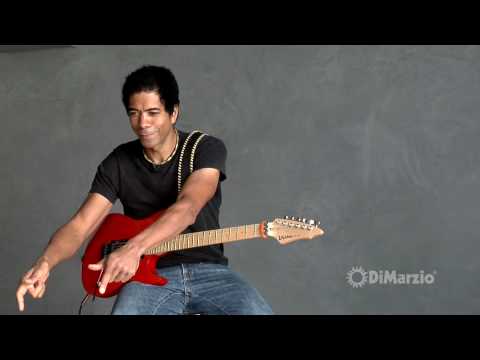
Z: So are you not, how does it effect open lines, you just push it all the way down by the locking nut?
GH: I do, and luckily it doesn’t effect things too much. However, I very soon am going to be working with a new guitar company, and I’m no longer going to be using the Floyd Rose, so its going to be a lot easier to just get it past the nut, and not have to worry as much anymore. The Floyd Rose makes it a little bit difficult, there are sometimes, there are certain things that I do where I have to literally lift it up over the nut, so that I have genuine open strings. But as far as harmonics and all that stuff, it doesn’t effect.
Z: You started out, I remember guitar magazines when I was a kid, the first Shrapnel album, how’s your style, it sort of seems like you took a big, more jazz or fusion turn, and then you also played with Michael Jackson, Justin Timberlake, and NSYNC. How does your approach change for all of that?
GH: I think that, with anything, I’ve evolved. I don’t know that evolved necessarily equates to getting better. But at the time I had done my first album, and the we did a couple of band, vocal band, I had a band called Howe II.
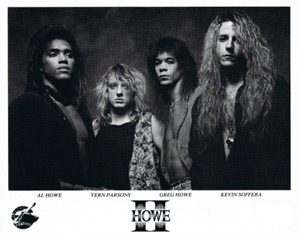
Z: With your brother.
GH: With my brother, yeah. My final album from my original contract required me to do another instrumental album. The thing was, as far as technique goes, so much, I mean, really, nothing has surpassed, even today, Paul Gilbert, and stuff that I was doing, all those guys were doing back then. But what has gotten a lot better, just musicality. So when I did (my album) Introspection, my thought was, I don’t want to push the envelope in terms of technique, I’d rather push the envelope in terms of musicality. Just see if I can take it to a new level, in terms of music. Because that’s all I knew. I didn’t know where else to go, really. So it was actually really a cool, it’s kind of cool that that was the case, if there had been some other things, technically, that I could have done, I may not have gone that route. So yeah, I think part of it was that direction came from wanting to expand musically, but another part of it came from, also, thinking to myself, what can I do that is going to keep people interested, that’s not just another fast lick or some other crazy arpeggio. Something has to be expanded in a different area.
Z: I was watching the video of “Story’s Ending,” the acoustic version, and in the bridge you start doing some percussive style, is that something you’re incorporating more? I always think of Andy McKee or Preston Reed when I think of that style. Is that something that is massive a part, or just “oh we don’t have a drummer?”
GH: It was kind of we don’t have a drummer, yeah. It was more like, this would be fun to do. I don’t consider myself a master acoustic player. I’m not, you know, I’m not Tommy Emmanuel. I just try to think of anything that’s going to be fun and musical to add to it, and it just seemed appropriate.
Z: Your writing process. In a lot of the interviews, it seems like you were writing lyrics, also, and the melodies, or is that something that was more integrated as Meghan became a part of it?
GH: Kevin and I handled all the lyrics. Usually I handle the melodies. I tend to hear melodies, and I hear vowel sounds, right? Before lyrics. And so a lot of times we end up writing lyrics that fit with the vowel sounds that I’m hearing in my head. Which is an odd way of writing.
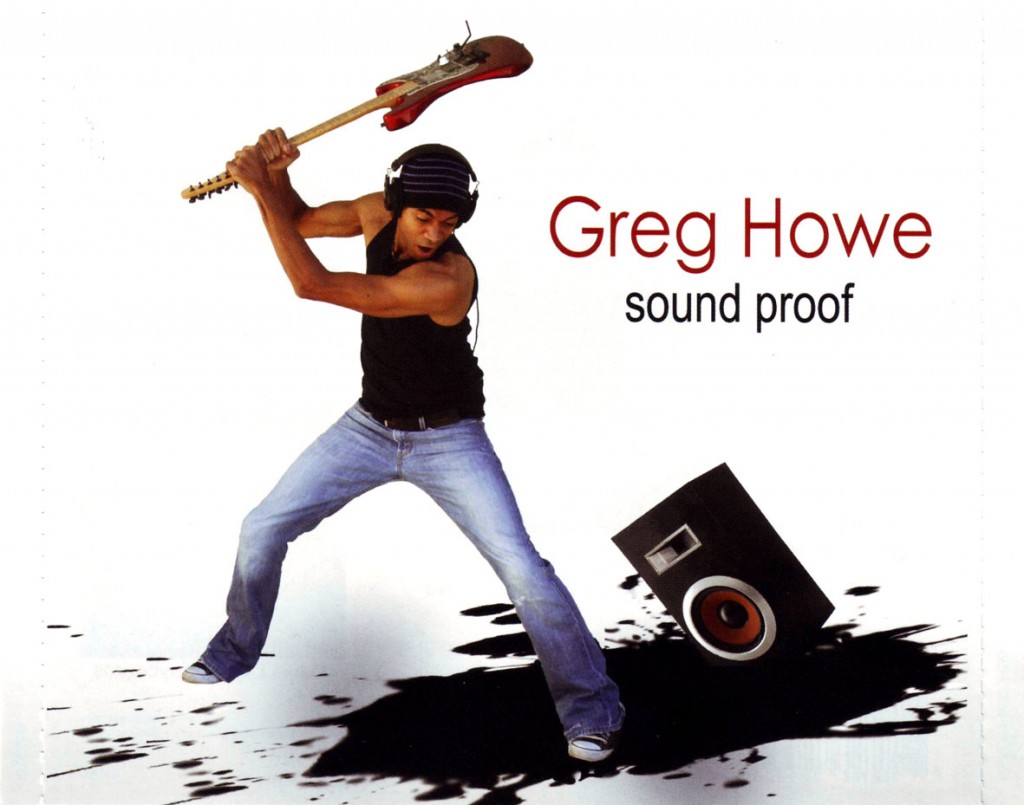
Z: So, are you thinking of always of vocal, or could this be where you worked it out on guitar, and so there’s instrumental versions of all of these somewhere?
GH: No. Vocal songs, in my mind, are written a little differently. Like, my whole approach is different. It’s a little hard to explain, but there are just certain things that I know I can do as an instrumentalist, that wouldn’t translate correctly, or ideally, as a vocal melody. You can have catchy melodies, as a guitarist, that are still way too complex for a singer. So the process is a little different. It’s hard to put it into words, but it’s a different thing. For me, it’s fun, because inspiration is everything to me. I’m most inspired by challenges. Anything that I haven’t done is what inspires me. If I’ve already done it, it’s hard for me to get excited about it.
Z: DV Mark amps. Tell me about your new signature amp, the Maragold.
GH: Yes, it’s a cool amp, it’s a very basic, old school, sort of British-type model. I wanted something that, when they approached me, they sent me some stuff, it was all cool, but it wasn’t really the direction that I tend to like. It was much more sort of Mesa Boogie scooped-mid, a lot of thick, heavy stuff. I wanted something that was more like an organic, old Marshall kind of thing. And so we worked on it. They flew me out there, and we just started working. It’s all-tube, it’s 40 watts so you can push the output section quite a bit, there’s some sag on the amp so you really get that natural compression. It’s cool, I like it.
Z: Your bass player mentioned that it’s the same company as the MarkBass.
GH: That’s exactly right, so it’s ideal.
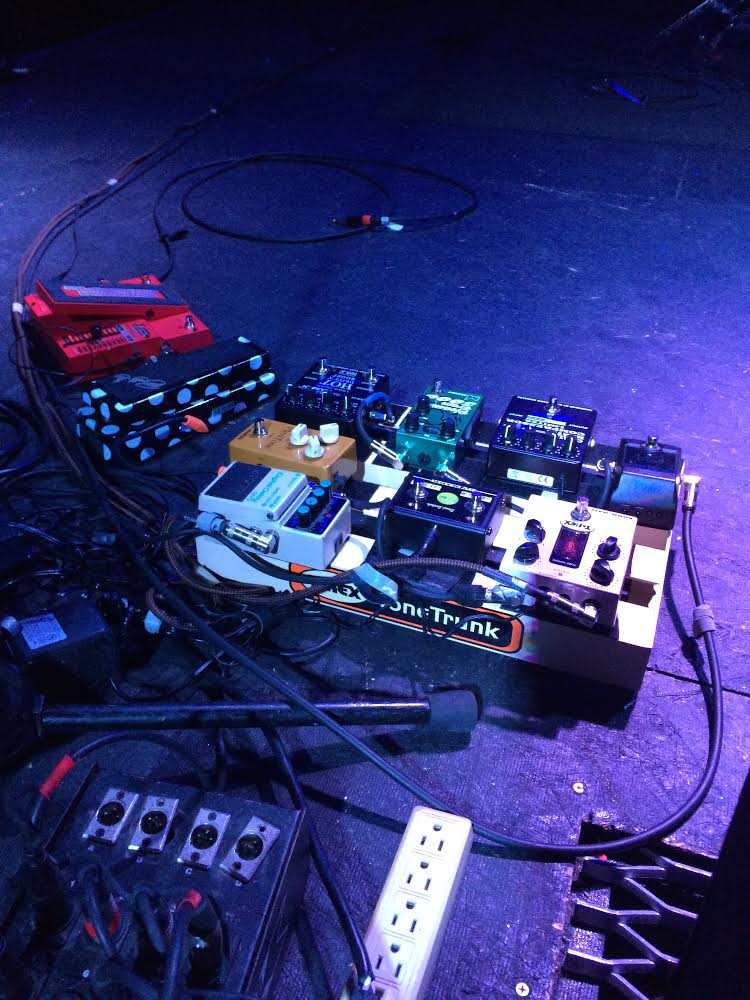
Z: When I was in the Army, in the band, and we had a lot of their gear, and it’s like “I think they forgot to put the stuff in it.” Because they’re so light. Although it’s a tube amp, is it still similar weight issues, or is it you have a roadie for that so you don’t really care.
GH: I do, but it is light. All their stuff is light. Their cabinets, their amps. It’s sort of their theme, which is really nice for us musicians.
Z: Oh, absolutely. I have a Mesa Mark V, and I first saw my friend with the Mark Bass thing, and I was like, “I hate you with everything in me.”
GH: Right? Exactly.
Z: Your legato is pretty unique. I guess, kind of an Allan Holdsworthian, so no pull-offs, or that seems like what I was hearing. Or, maybe less pull-offs, a lot more hammer-ons?
GH: I would say that, if that’s the perception, that’s kind of cool. But I am not playing like Allan does, where he actually will do hammer-ons sometimes during decends. It’s definitely pull-offs with me.
Z: It’s just so fluid that it’s like, it’s not… I know with him, he specifically dislikes the sound of pull-offs, so he found that work-around for it.
GH: And I think it’s great for him. I actually don’t dislike that sound.
Z: I’m also like, “that’s what it sounds like, that’s what’s cool about guitar.”
GH: The interesting thing about Allan is that he’s an amazing guitarist who seems to have made a career out of doing everything possible to not sound like a guitar player. And succeeded at it. He doesn’t like “guitar-isms,” so he’s not doing anything that sounds like a guitar. It sounds amazing. But I like guitar-isms, and I like the sound of pull-offs. But if it doesn’t sound like that, that’s got awesome, interesting…
Z: I noticed you have the Whammy DropTune pedal. You were using the momentary switch, to drop it down I guess.
GH: You’re very observant. You were totally paying attention.
Z: I was right on the side, looking through the amps, to see that. So is that, “OK, I need that low D and I don’t want to tune to Drop-D for it.
GH: That’s exactly right. “Paradigm Tsunami” is one of those songs that I actually recorded with two different guitars because there’s one section that needs the low D. I don’t have a seven-string, and I really don’t want one, because I just, I know it’s going to confuse me, I know it.
Z: I pretty much made the switch to seven, and I was playing a friend’s six-strings today, and I’m like, “I can’t find it.” I’m completely avoiding the low E. What’s going on here?
GH: Right. It scares me. I’ll probably eventually get one. But in the meantime, this is actually a pretty decent solution. Luckily, I’m not doing intricate stuff. So if it’s just for chords, heavy chords, it works pretty well.
Z: Morpheus had made a Drop Tune one, and for me, it worked really well for heavier distortion. But anything cleaner, I could hear the original tone acoustically, and down a whole step or half step or whatever, so “OK, this is only getting used if I need to go metal on it.”
Sound Proof, your solo album, was a lot more fusion style. “Tell Me Something Good,” the Rufus and Chaka Khan cover, I was completely blown away by how vocal that melody is.
GH: Oh wow. Thank you.
Z: I was in Iraq at the time, and I downloaded it, that was just, “Ah, I gotta go practice even more.” But just that vocal melody, not like a guitar player trying to play it. Really captured the nuances.
GH: Well, I love the song. I’ve always loved it since I was a little kid. What happened was, we recorded that album up in Prairie Sun Studios, with Mike Varney, and we kind of ran out of songs. And we ran out of time. It was like, we need some more material. And Dave Cook, the keyboard player, kept playing the intro to that song, just during rehearsals, just randomly. And I was like, “Do you know that song? ‘Cause that would be a cool remake.” And he’s like, “Yeah.” So it was really important to me to capture that, the soulfulness of Chaka Khan, because that’s the whole song. I’m glad that you’re hearing that.
Z: On “Morning View,” to me, the integration of the “blues-isms,” the more bluesy playing, and your legato technique, is just seamless, going between them. Is that something, how does that develop? Or that’s just, “I’m Greg Howe, that’s how I play?”
GH: I think it’s kind of that way, yeah.
Z: For a while, you were playing with Michael Jackson, taking over for Jennifer Batten.
GH: Briefly, yeah.
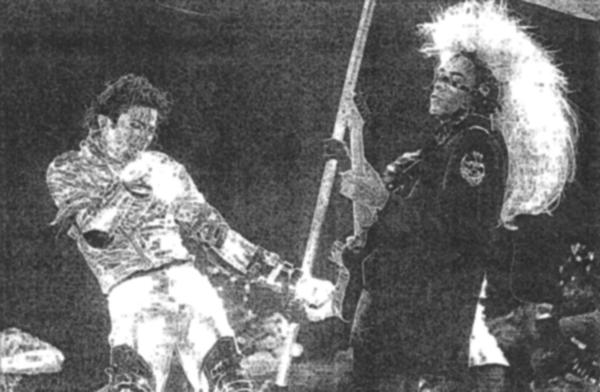
Z: Then Enrique Iglesias, NSYNC and Justin Timberlake. How does that come about?
GH: Well, the Michael Jackson thing was cool, because Jennifer and I had met at a NAMM show, and connected, and I’m a fan of hers, and she was kind of a fan of me. She just basically said, if I ever just step off the tour, for any reason, I’m going to recommend you. And I was like, “Yeah!” And that’s exactly what she did. Her mother was ill, and she had to step off for as long as it took for either her mother to recover, or pass away. Unfortunately, she did pass away, but I was on that tour for about five weeks. Afterwards, I hooked up with a guy named Kevin Antunes, who’s an amazing music director for all the biggest bands. NSYNC, Backstreet Boys, Madonna, many more. He’s done every huge pop artist there is. One of the guitar players he’s worked with is a guy named Skip Dorsey, who know of me, and through him, I met Kevin, and then Kevin asked me if I wanted to do the Enrique tour. At that time, I was kind of like, that would be fun, you know? To just go out and do those kinds of things. It’s really an interesting situation, because, no offense to that world, because I love a lot of that music, but the truth be told, it’s not difficult. Yet you get paid way more than all these fusion gigs. It was actually kind of like a vacation for me for four or five years. Having fun, traveling the world, and playing some fun songs that were not real difficult. Meeting a lot of people, it was just fun.
Z: Maragold, the reason we’re here, I just watched an interview, so I feel like I’m repeating stuff, you probably get asked it all over again. How did this group get put together? Where did the different pieces come from?
GH: Kevin, the bass player, he and I have known each other for years. We’ve always talked, sort of nonchalantly, about putting a vocal band together at some point. But when I moved to the west coast, (I lived in California for about four years, then I moved to Vegas), he was on the east coast, so it wasn’t realistic to do it, but we still kept talking about it. Then we got together and did some writing. Originally we thought, “this is pretty cool.” We had a singer in mind, that singer ended up getting a gig with Chris Daughtry, and so he was not available anymore.
V: Chris Daughtry, isn’t he sort of a singer?
GH: Chris Daughtry is a singer, yes. The guy I’m talking about didn’t get a gig singing with Daughtry.
V: Like they fired him and still called it Daughtry.
GH: (Laughs) No, The guy we originally wanted to sing, he’s an extremely talented singer, as well as songwriter, plays guitar, plays keyboard. He’s one of those guys, does everything.
V: Oh, I hate that guy.
GH: And looks great at the same time. Then we had some material together, but we didn’t have a singer. And then Kevin was playing in a cover band on the east coast, and suddenly discovered this singer, who’s playing in another cover band in his area. And that was Meghan, and he turned me on to her. And I thought, “Wow, she’s amazing.” And she really is.
Z: Just powerful. Voice, stage presence, everything.
GH: She’s got everything.
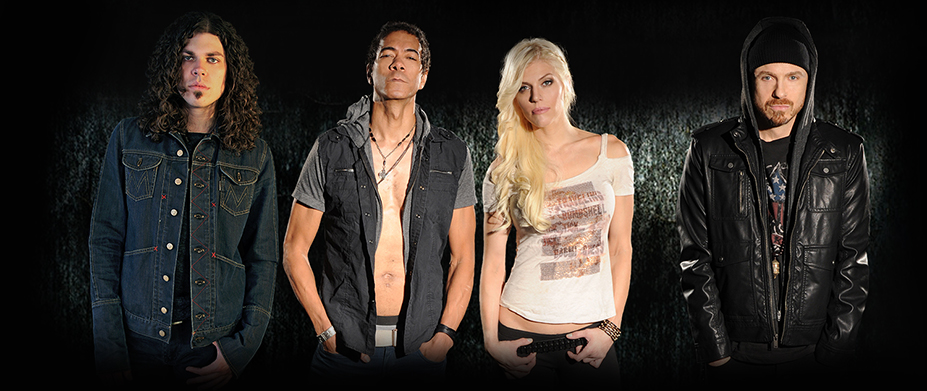
Z: Y’all’s band chemistry together…
GH: It’s really cool.
Z: …it’s like, “Oh my God.” I’d seen the videos, but then seeing you guys live, it’s just… Oh damn.
GH: That’s so nice to hear, it really is. So she agreed. I asked her, “Would you want to do it?” She said yeah. That’s how it happened.
Z: And super guitar nerd question: what kind of picks are you using?
GH: I use Dunlop 2.0s. I use these things (pulls a pick from his pocket).
Z: Oh, OK. Awesome. They’re really thick, and beveled.
GH: Tortex, yeah.
Z: Never went for the Jazz IIIs?
GH: I didn’t. I’ve never done that for some reason. The little ones? I don’t know why, they don’t work for me. I’m not great at picking. What I notice with these, the attack is actually less. If I used just a regular Fender medium, there’s a lot more attack. But you sort of have to be more accurate. And I just haven’t practiced alternate picking a lot, recently. And, if I’m going to be honest, I’m not a huge fan of that sound. Sometimes it just cool to have, for a second, an explosive sort of percussive thing.
Z: Like being able to if I want to, but I really don’t want to.
GH: Exactly.
Z: One other thing and I swear I’ll let you go: A lot of your… it almost looks like a violin player’s vibrato, that’s covering like five frets, those really wide slides that are like, really rapid. (Damn that’s awesome!)
GH: Thank you!
Z: Or is there a more specific goal for that?
GH: Well, honestly, that whole thing happened from my first album. I recorded my first album with Mike Varney, and there was a lick that I played during the solo. Mike Varney heard the lick and said, “I like the lick, but can you just give me a super aggressive, really aggressive vibrato?” So we just punched in the last note of the lick. And I gave it everything that I had, and he was like, “Eh. It’s not quite there.” So then I had seen an old Dokken video, where George Lynch will do that sometimes, where it’s more as an effect. So I did that, and he said “Yes. That’s it.” So I thought to myself, That did sound pretty cool, it’s got a sassy kind of different thing about it. So if it sounds good here, sounds good once, probably it will sound good 570 thousand times. It just got sort of implemented into my style. So actually, it’s probably the vibrato that I use most.
Z: So it is functioning as a vibrato, not as much a slide.
GH: It is. It’s very habitual at this point, I don’t even think about it.
Dan Conway (drums): Are you talking about this thing? (mimes vibrato motion)
GH: Yeah, this thing.
DC: When I saw him do that, I always wondered how that happened on the record. When I saw that happen, it was awesome. It was like a moment of clarity. I was like “That’s how!”
GH: (laughing) “A moment of clarity.”
Z: Thank you for spending so much time with me, talking about so much guitar stuff. Since I was a little kid seeing you in guitar magazines. I remember the HM Strat ad, I thought “That’s the coolest guitar I’d ever seen.”
GH: They’re still cool. I still like those.
Z: I just saw one online recently. I was just like, “That’s the coolest guy ever playing the coolest guitar ever.
GH: I don’t know about that.
Z: And I told you what Sound Proof meant to me. Just thank you again for your time.
GH: Oh, I really appreciate it.
Z: Again, this is Brad Bailey with ZRock’R Magazine, and Greg Howe of the amazing, completely killer live band, Maragold, that you all need to see, because they’re killing it. Thank you.
